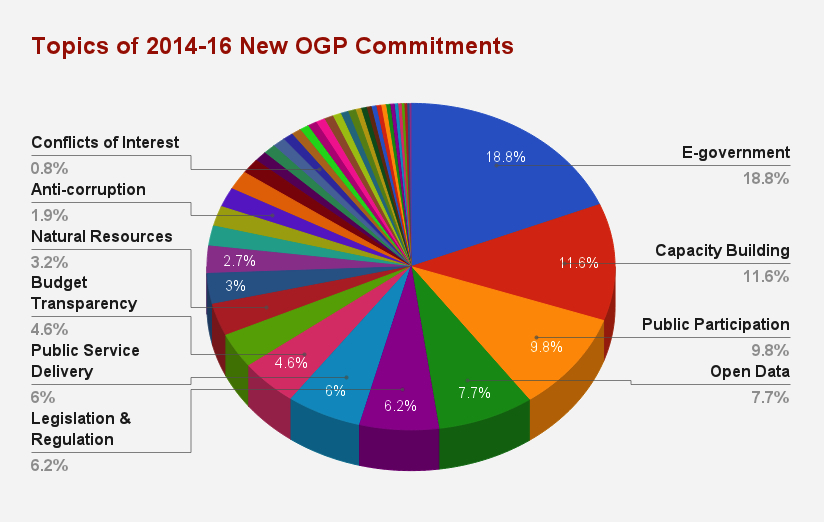New Data from OGP Provides New Tracking Tool
On the eve of this week’s Open Government Partnership summit in Latin America, the OGP has released new data compiling every commitment made by countries for the 2014-2016 OGP cycle.
The Support Unit of OGP went through almost 900 new commitments in the national action plans of 49 countries and categorized them by “thematic tags,” as Abhinav Bahl of OGP explains.
The new set of 42 thematic tags covers key horizontal (e.g. Open Data, Capacity Building, etc.) and vertical (e.g. Education, Asset Disclosures, etc.) open government topics. We then broke down every action plan into its constituent commitments, applying appropriate tags to fully describe each commitment. For example, if a commitment on Access to Information involved passing legislation, training of officers, and implementing an online platform, the relevant tags were applied to capture all those aspects of the commitment.
Three years into OGP, the cumulative tally of nearly 3,000 commitments represents a massive inventory of program proposals, planned reforms and new digital projects. The Open Government Partnership, like any one of its member countries, can promote its own knowledge-sharing and accountability with a good data (and open data) strategy.
You can use the new data, for example,”to find gaps and identify model commitments to include in future action plans in your country,” OGP civil society engagement lead Paul Maassen wrote to colleagues Saturday. “Or use the data to compare action plans, analyze trends, and track performance across countries.”

While OGP is still working on a data warehouse of all commitments and assessments, the newest data set organized by country, agency and theme makes it possible to do simple breakdowns like the one above (created using Excel and Google Spreadsheets in about 30 minutes).
This quick snapshot reveals, for instance, that at least 25 percent of 2014-2016 commitments include a focus on digital governance through E-government or Open Data, while another 22 percent involve improving engagement through Capacity Building and Public Participation. It’s a nice simple example of how a group like #TABridge can use data to track the progress of one country or the overall OGP cohort on the programs most related to our own work.
The Transparency and Accountability Initiative (T/AI) also just announced a new chapter in our Open Government Guide, focused on the need for vigilance on privacy and security amid open government projects, and we are currently sponsoring research on the effectiveness of OGP. (T/AI has been a strategic partner to OGP since its inception in 2011.)
To learn more about this week’s OGP Latin America summit, go to www.ogpsanjose.org and follow #OGPSanJose on Twitter. And watch the web page of OGP’s Independent Reporting Mechanism for upcoming announcements of new digital tools for tracking OGP progress.